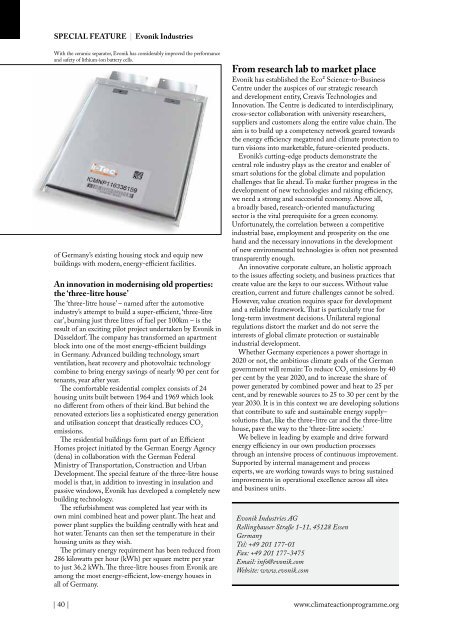Climate Action 2010-2011
Create successful ePaper yourself
Turn your PDF publications into a flip-book with our unique Google optimized e-Paper software.
SPECIAL FEATURE | Evonik Industries<br />
With the ceramic separator, Evonik has considerably improved the performance<br />
and safety of lithium-ion battery cells.<br />
of Germany’s existing housing stock and equip new<br />
buildings with modern, energy-efficient facilities.<br />
An innovation in modernising old properties:<br />
the ‘three-litre house’<br />
The ‘three-litre house’ – named after the automotive<br />
industry’s attempt to build a super-efficient, ‘three-litre<br />
car’, burning just three litres of fuel per 100km – is the<br />
result of an exciting pilot project undertaken by Evonik in<br />
Düsseldorf. The company has transformed an apartment<br />
block into one of the most energy-efficient buildings<br />
in Germany. Advanced building technology, smart<br />
ventilation, heat recovery and photovoltaic technology<br />
combine to bring energy savings of nearly 90 per cent for<br />
tenants, year after year.<br />
The comfortable residential complex consists of 24<br />
housing units built between 1964 and 1969 which look<br />
no different from others of their kind. But behind the<br />
renovated exteriors lies a sophisticated energy generation<br />
and utilisation concept that drastically reduces CO 2<br />
emissions.<br />
The residential buildings form part of an Efficient<br />
Homes project initiated by the German Energy Agency<br />
(dena) in collaboration with the German Federal<br />
Ministry of Transportation, Construction and Urban<br />
Development. The special feature of the three-litre house<br />
model is that, in addition to investing in insulation and<br />
passive windows, Evonik has developed a completely new<br />
building technology.<br />
The refurbishment was completed last year with its<br />
own mini combined heat and power plant. The heat and<br />
power plant supplies the building centrally with heat and<br />
hot water. Tenants can then set the temperature in their<br />
housing units as they wish.<br />
The primary energy requirement has been reduced from<br />
286 kilowatts per hour (kWh) per square metre per year<br />
to just 36.2 kWh. The three-litre houses from Evonik are<br />
among the most energy-efficient, low-energy houses in<br />
all of Germany.<br />
| 40 |<br />
From research lab to market place<br />
Evonik has established the Eco² Science-to-Business<br />
Centre under the auspices of our strategic research<br />
and development entity, Creavis Technologies and<br />
Innovation. The Centre is dedicated to interdisciplinary,<br />
cross-sector collaboration with university researchers,<br />
suppliers and customers along the entire value chain. The<br />
aim is to build up a competency network geared towards<br />
the energy efficiency megatrend and climate protection to<br />
turn visions into marketable, future-oriented products.<br />
Evonik’s cutting-edge products demonstrate the<br />
central role industry plays as the creator and enabler of<br />
smart solutions for the global climate and population<br />
challenges that lie ahead. To make further progress in the<br />
development of new technologies and raising efficiency,<br />
we need a strong and successful economy. Above all,<br />
a broadly based, research-oriented manufacturing<br />
sector is the vital prerequisite for a green economy.<br />
Unfortunately, the correlation between a competitive<br />
industrial base, employment and prosperity on the one<br />
hand and the necessary innovations in the development<br />
of new environmental technologies is often not presented<br />
transparently enough.<br />
An innovative corporate culture, an holistic approach<br />
to the issues affecting society, and business practices that<br />
create value are the keys to our success. Without value<br />
creation, current and future challenges cannot be solved.<br />
However, value creation requires space for development<br />
and a reliable framework. That is particularly true for<br />
long-term investment decisions. Unilateral regional<br />
regulations distort the market and do not serve the<br />
interests of global climate protection or sustainable<br />
industrial development.<br />
Whether Germany experiences a power shortage in<br />
2020 or not, the ambitious climate goals of the German<br />
government will remain: To reduce CO 2<br />
emissions by 40<br />
per cent by the year 2020, and to increase the share of<br />
power generated by combined power and heat to 25 per<br />
cent, and by renewable sources to 25 to 30 per cent by the<br />
year 2030. It is in this context we are developing solutions<br />
that contribute to safe and sustainable energy supply–<br />
solutions that, like the three-litre car and the three-litre<br />
house, pave the way to the ‘three-litre society.’<br />
We believe in leading by example and drive forward<br />
energy efficiency in our own production processes<br />
through an intensive process of continuous improvement.<br />
Supported by internal management and process<br />
experts, we are working towards ways to bring sustained<br />
improvements in operational excellence across all sites<br />
and business units.<br />
Evonik Industries AG<br />
Rellinghauser Straße 1-11, 45128 Essen<br />
Germany<br />
Tel: +49 201 177-01<br />
Fax: +49 201 177-3475<br />
Email: info@evonik.com<br />
Website: www.evonik.com<br />
www.climateactionprogramme.org












